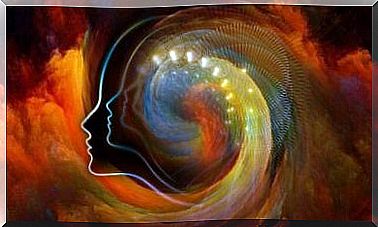Types Of Suggestion: When Led To New Ideas

Suggestion is one of the most interesting phenomena in the human mind. It is a mental state where a person experiences sensations and ideas that someone suggests or leads them to. Suggestion can also mean that you stop emotions that a person then stops experiencing. It is something that has been planted in our mind without us being aware of it. In this article you will learn more about different types of suggestion.
The concept of suggestion seems very old – there is in fact evidence that hypnotic techniques were used in China, India, Greece, Mexico and many other cultures thousands of years ago. Some remnants suggest that Egyptian culture used a type of hypnosis more than 3,000 years ago that is broadly similar to those used today. During these times, the phenomenon was associated with a magical and religious experience. In modern times we can place the phenomenon in four types of suggestion.
Franz Anton Mesmer, who lived in the 18th century, was the first to try to find a rational explanation for the power of suggestions. However, he combined scientific observations with charlatanry, and this led him to be viewed with great disgrace.
Later, it was Dr. James Braid who really made the effort to give these phenomena a scientific status. Many other scientists followed him and managed to explain hypnosis, especially based on the concept of the subconscious. Let us now further investigate the different types of suggestion that exist.
There are four different types of suggestion. These are: direct, hypnotic, indirect and self-suggestion. Direct suggestions come from an authority exercised by a person over the person exposed to it. Hypnotic suggestions come from a hypnotic trance, which can occur in different ways.

Indirect suggestions, on the other hand, are what happens when other people’s ideas are put into the mind as if they were one’s own. Finally, self-suggestion is something that a person does to himself, more or less intentionally. The person becomes convinced of incorporating an idea or a feeling into his mind. An example might be if it’s cold outside and a person tries to tell himself “I’m not freezing, I’m not freezing”, in an attempt to make himself feel that it is not cold.
There is also a subtype of self-suggestion. This is what we might call involuntary self-suggestion. This happens when an individual, without wanting to, convinces himself of an idea. Sometimes it’s an unwanted idea. For example, when someone gets a rash on the skin and begins to think that it is something serious. He does not go to the doctor in an attempt to avoid getting bad news, but is sure that he is suffering from a terrible disease.
Hypnotic suggestion
Suggestion has enormous power over our actions and of course about our way of perceiving reality. Hypnotic suggestions contribute to therapeutic purposes. Its efficiency is limited. First, because not everyone is suggestive enough of hypnotism. Secondly, because suggestions in a state of limited consciousness do not stand up over time.

Direct suggestion
Direct suggestion comes from people who can convince others, even about dangerous ideas. These individuals do not speak to people’s logical thinking, but to their emotions. Especially to their fears and desires. They break down people’s will and make them do what they want. It is a form of suggestion associated with power, but not necessarily with considerable force. We find it in everything from relations and sales to heads of state and dictators.
Indirect suggestion
Indirect suggestion is more complex and more difficult to detect. It comes from the world’s ideas that society creates. Different institutions create and market them, even if we are not aware of it. For example, some religious beliefs fit into this category. That there is a kingdom of heaven or life beyond this, for example. Many people believe it literally, even though they have no evidence to confirm it. Some even see it as a threat if someone tries to prove it in some other way.
Self-suggestion
Self-suggestion, especially the involuntary type, is more present in our lives than we might wish. Much of what we think is nothing more than a set of unfounded beliefs. We do many things because we have seen others do them or simply because of habit. But we do not always stop to look for a reason why we do as we do. What is clear is that we have convictions about ourselves and about everything in general. But that many of them would not survive a careful conscious analysis. That’s just the way we are.









